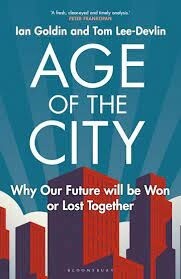Age of the City by Ian Goldin and Tom Lee-Devlin21
Visionary Oxford professor Ian Goldin and The Economist's Tom LeeDevlin show why the city is where the battles of inequality, social
division, pandemics and climate change must be faced.
From centres of antiquity like Athens or Rome to modern metropolises like
New York or Shanghai, cities throughout history have been the engines of
human progress and the epicentres of our greatest achievements. Now, for
the first time, more than half of humanity lives in cities, a share that continues
to rise. In the developing world, cities are growing at a rate never seen before.
In this book, Professor Goldin and Tom Lee-Devlin show why making our
societies fairer, more cohesive and sustainable must start with our cities.
Globalization and technological change have concentrated wealth into a small
number of booming metropolises, leaving many smaller cities and towns
behind and feeding populist resentment. Yet even within seemingly thriving
cities like London or San Francisco, the gap between the haves and havenots continues to widen and our retreat into online worlds tears away at our
social fabric. Meanwhile, pandemics and climate change pose existential
threats to our increasingly urban world.
Professor Goldin and Tom Lee-Devlin combine the lessons of history with a
deep understanding of the challenges confronting our world today to show
why cities are at a crossroads a€ and hold our destinies in the balance.
Ian Goldin is Professor of Development and Globalisation at the University of
Oxford and former Vice President of the World Bank. Ian's recent publications
include Rescue: From Global Crisis to a Better World (HC, 2021), Terra
Incognita: 100 Maps to Survive the Next 100 Years (PRH, 2020), and Age of
Discovery (Bloomsbury, 2016).
Tom Lee-Devlin is a writer at The Economist . He previously worked as a
management consultant at Bain & Company and led research for the firm's
global think tank, Bain Futures.
Bloomsbury
On Sale: Sep 12/23
6.02 x 9.21 • 256 pages
9781399406147 • $35.00 • CL - With dust jacket
Social Science / Human Geography
